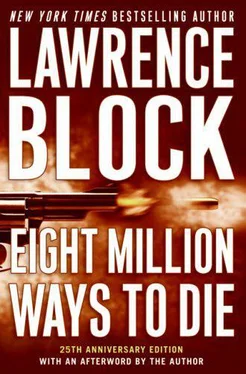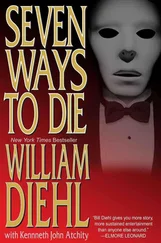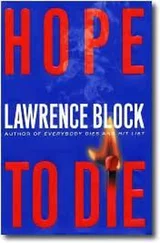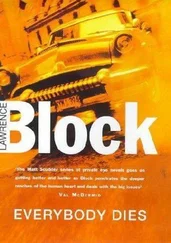"That's Donna's place," he said. "I told you about Donna."
"The poet."
"She's all excited. She got two poems accepted by this magazine in San Francisco. She'll get six free copies of the issue the poems appear in. That's as much pay as she'll get, just copies of the magazine."
A light turned red in front of us. He braked for it, looked left and right, then coasted through the light.
"Couple times," he said, "she's had poems in magazines that pay you for them. Once she got twenty-five dollars. That's the best she ever did."
"It sounds like a hard way to make a living."
"A poet can't make any money. Whores are lazy but this one's not lazy when it comes to her poems. She'll sit for six or eight hours to get the words right, and she's always got a dozen batches of poems in the mail. They come back from one place and she sends 'em out someplace else. She spends more on postage than they'll ever pay her for the poems." He fell silent for a moment, then laughed softly. "You know how much money I just took off of Donna? Eight hundred dollars, and that's just for the past two days. Of course there's days when her phone won't ring once."
"But it averages out pretty well."
"Pays better than poems." He looked at me. "Want to go for a ride?"
"Isn't that what we've been doing?"
"We been going around in circles," he said. "Now I'm gonna take you to a whole nother world."
We drove down Second Avenue, through the Lower East Side, and over the Williamsburg Bridge into Brooklyn. Coming off the bridge we took enough turns to throw off my sense of direction, and the street signs didn't help much. I didn't recognize the names. But I watched the neighborhood change from Jewish to Italian to Polish and had a fair idea of where we were.
On a dark, silent street of two-family frame houses, Chance slowed in front of a three-story brick structure with a garage door in the middle. He used a remote-control unit to raise the door, then closed it after we had driven in. I followed him up a flight of stairs and into a spacious high-ceilinged room.
He asked if I knew where we were. I guessed Greenpoint. "Very good," he said. "I guess you know Brooklyn."
"I don't know this part of it very well. The meat market signs advertising kielbasa were a tip-off."
"I guess. Know whose house we're in? Ever hear of a Dr. Casimir Levandowski?"
"No."
"No reason why you should have. He's an old fellow. Retired, confined to a wheelchair. Eccentric, too. Keeps himself to himself. This place used to be a firehouse."
"I thought it must have been something like that."
"Two architects bought it some years ago and converted it. They pretty much gutted the interior and started from scratch. They must have had a few dollars to play with because they didn't cut many corners. Look at the floors. Look at the window moldings." He pointed out details, commented on them. "Then they got tired of the place or each other, I don't know what, and they sold out to old Dr. Levandowski."
"And he lives here?"
"He don't exist," he said. His speech patterns kept shifting, from ghetto to university and back again. "The neighbors never see the old doc. They just see his faithful black servant and all they see him do is drive in and drive out. This is my house, Matthew. Can I give you the ten-cent tour?"
It was quite a place. There was a gym on the top floor, fully equipped with weights and exercise machines and furnished with sauna and Jacuzzi. His bedroom was on the same floor, and the bed, covered with a fur spread, was centered beneath a skylight. A library on the second floor contained one whole wall of books and an eight-foot pool table.
There were African masks all over the place, and occasional groups of free-standing African sculpture. Chance pointed out a piece from time to time, naming the tribe that had produced it. I mentioned having seen African masks at Kim's apartment.
"Poro Society masks," he said. "From the Dan tribe. I keep one or two African things in all my girls' apartments. Not the most valuable things, of course, but not junk, either. I don't own any junk."
He took a rather crudely fashioned mask from the wall and presented it for my inspection. The eye openings were square, the features all geometrically precise, the overall effect powerful in its primitiveness. "This is Dogon," he said. "Take hold of it. You can't appreciate sculpture with your eyes alone. The hands have to participate. Go ahead, handle it."
I took the mask from him. Its weight was greater than I anticipated. The wood that composed it must have been very dense.
He lifted a telephone from a low teakwood table and dialed a number. He said, "Hey, darlin'. Any messages?" He listened for a moment, then put the phone down. "Peace and quiet," he said, "Shall I make some coffee?"
"Not if it's any trouble."
He assured me it wasn't. While the coffee brewed he told me about his African sculpture, how the craftsmen who produced it did not think of their work as art. "Everything they make has a specific function," he explained. "It's to guard your house or keep off spirits or to use in a particular tribal rite. If a mask doesn't have the power in it anymore they'll throw it away and somebody'll carve a new one. The old one's trash, you burn it up or toss it away cause it's no good."
He laughed. "Then the Europeans came and discovered African art. Some of those French painters got their inspiration from tribal masks. Now you've got a situation where there are carvers in Africa spending all their time making masks and statues for export to Europe and America. They follow the old forms because that's what their customers want, but it's a funny thing. Their work's no good. It doesn't have any feeling in it. It's not real. You look at it and you take it in your hand, and you do the same with the real thing, and you can tell the difference right away. If you have any feeling at all for the stuff. Funny, isn't it?"
"It's interesting."
"If I had any of the junk around I'd show you, but I don't own any. I bought some when I was starting out. You have to make mistakes to develop a feel for it. But I got rid of that stuff, burned it in the fireplace there." He smiled. "The very first piece I bought, I still have it. It's hanging in the bedroom. A Dan mask. Poro Society. I didn't know shit about African art but I saw it in an antique shop and I responded to the mask's artistic integrity." He stopped, shook his head. "Hell I did. What happened was I looked at that piece of smooth black wood and I was looking in a mirror. I saw myself, I saw my father, I was looking back through the damned ages. You know what I'm talking about?"
"I'm not sure."
"Hell. Maybe I don't know either." He gave his head a shake. "What do you figure one of those old carvers'd make of this? He'd say, 'Shit, what's this crazy nigger want with all these old masks? Why'd he go and hang 'em all over the damn wall?' That coffee's ready. You take yours black, right?"
He said, "How's a detective go about detecting, anyway? Where do you start?"
"By going around and talking to people. Unless Kim got killed coincidentally by a maniac, her death grew out of her life." I tapped my notebook. "There's a lot you don't know about her life."
"I guess."
"I'll talk to people and see what they can tell me. Maybe it'll fit together and point somewhere. Maybe not."
"My girls'll know it's cool to talk to you."
"That'll help."
"Not that they necessarily know anything, but if they do."
"Sometimes people know things without knowing they know them."
"And sometimes they tell without knowing they told."
"That's true, too."
He stood up, put his hands on his hips. "You know," he said, "I didn't figure to bring you here. I didn't figure you needed to know about this house. And I brought you without you even asking."
Читать дальше












